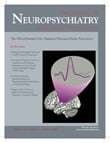Posttraumatic Stress Disorder-Like Symptoms After Treatment With Acetylcholinesterase Inhibitors
SIR: Acetylcholinesterase inhibitors are used to improve cognitive function. They are approved for the treatment of Alzheimer’s disease, but have also proven useful in vascular dementia. 1 Although these medications are used to improve memory, we report a case in which they spurred the return of memories the patient would have preferred to avoid.
Case Report
The patient is a veteran who had served in combat with a special forces unit in the Vietnam War. Since retiring from military service he had a history of avoiding combat-related stimuli, but otherwise had not had symptoms of posttraumatic stress disorder (PTSD). At the age of 57, the patient suffered a hemorrhagic, right parietofrontal stroke. A subsequent magnetic resonance image (MRI) also demonstrated chronic cerebellar and cerebral infarcts with mild subcortical and frontal atrophy. After the stroke, he developed symptoms of depression, anxiety, and cognitive impairment. He was treated with individual therapy, cognitive rehab, and multiple psychiatric medications. This resulted in significant improvement. At one point, he had been on a brief trial of galantamine, but had stopped this medication after 8 days due to the side effect of sedation. No symptoms of PTSD were noted in the medical record at that time.
When we first saw the patient, at the age of 61, his symptoms were well controlled and his personality was pleasant and, according to his wife, almost back to what it had been before the stroke. His major ongoing problem at that point was cognitive impairment. Neuropsychological testing showed problems in verbal memory, executive function, and fine motor abilities.
The patient was started on a regimen of donepezil, 5mg/day. One month later, when no significant changes were seen, the dose of donepezil was increased to 10mg/day. The patient himself discontinued this medication 2 weeks later when he developed nightmares, flashbacks, and intrusive memories of Vietnam. During the treatment, his avoidance had worsened. He had become more irritable, had increased problems with sleep, and was more anxious and easily startled. Once he stopped the donepezil, these PTSD-like symptoms remitted. Since he had previously not had such symptoms when taking galantamine, this medication was substituted at a dose of 4mg b.i.d. When he checked in 2 weeks later, he reported that he had experienced a similar recurrence of PTSD symptoms, although not as severe. Galantamine was stopped and symptoms again remitted. Continuing follow-up for a year demonstrated no recurrence of PTSD-like problems.
Comment
Toxic acetylcholinesterase inhibitors, such as organophosphates, have previously been implicated in the pathophysiology of Gulf War Syndrome and possibly PTSD. 2 , 3 Acetylcholinesterase-inhibiting medications, however, have not previously been reported to cause such symptoms. Research into the neurotransmitters involved in PTSD has now focused more on the role of norepinephrine, serotonin, and glucocorticoids. 4 This case illustrates, however, that given a precarious combination of past trauma and neurophysiological damage, acetylcholinesterase inhibitors can awaken PTSD-like symptoms. This may re-spark interest in the role of acetylcholine and PTSD.
1. Erkinjuntti T, Roman G, Gauthier S: Treatment of vascular dementia-evidence from clinical trials with cholinesterase inhibitors. Neurol Res 2004; 26:603–605Google Scholar
2. Wickler I: The big easy serves up a feast to visiting neuroscientists: rat model for Gulf War Syndrome? Science 1998; 278:1404Google Scholar
3. Kaufer D, Friedman A, Seidman S, et al: Acute stress facilitates long-lasting changes in cholinergic gene expression. Nature 1998; 393:373–376Google Scholar
4. Pitman RK, Delahanty DL: Conceptually driven pharmacologic approaches to acute trauma. CNS Spect 2005; 10:99–106Google Scholar



